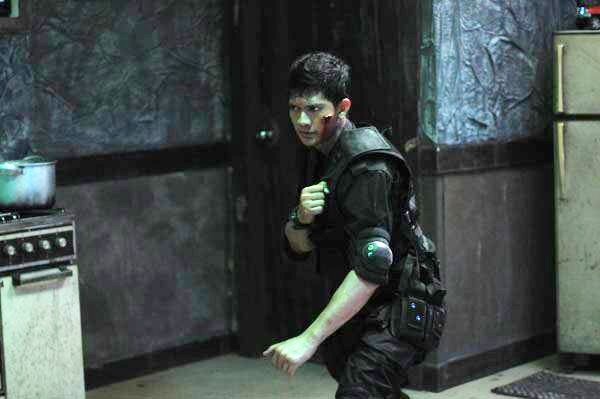The Raid is what one might describe as an up-down action movie, both in terms of its directional thrust - starting on the ground floor of a tower block, then frenetically running, punching and kicking its way north - but also to acknowledge the fact that nobody in this construction appears capable of staying on their feet for very long. The other crucial axis the film turns on, however, is very much West to East: it's the work of young Welsh filmmaker Gareth Huw Evans - you'd never guess he was Welsh, with that name - who travelled to Indonesia in pursuit of either a dynamic new martial art to document, enlightenment, or the steady supply of shattered bones made possible by the area's relaxed health-and-safety guidelines.
Well, as the Evanses would doubtless say, there's globalisation for you. The move may have appeared counter-intuitive in movie terms - don't most aspirant tyros seek their fortunes by going West? - yet at a time when one can put all the action movie heavyweights one can think of in the same film and still only end up with the 15-rated The Expendables, it's impossible to imagine the modern, infantilised Hollywood permitting a bodycount this elevated in a project this fundamentally brutal. At the risk of getting overly Aristotelian about a flick best taken in on a Friday or Saturday night - when, if nothing else, you can take the morning after to recover - The Raid plays like a bracing return to first principles: this really is live free or die hard. It's practically a snuff movie, in everything but the body bags.
The set-up is appreciably simple. A unit of armored police has been bussed into a tower block in which a crime lord has been offering temporary shelter to every passing ne'er-do-well and nogoodnik - consolidating his power by, in effect, insulating himself from the relevant authorities with toxic human asbestos. The raid, inevitably, goes badly wrong, leaving our plucky cop hero Rama (Iko Uwais) - and we know he's the hero, because we've earlier seen him saying goodbye for the day to a heavily pregnant wife - to move from floor to floor, seeking to achieve pretty much singlehandedly what his colleagues have failed to do en masse.
This progression suggests The Raid as the ultimate boiling-down - refinement wouldn't quite be the word - of all those films that sought to turn first-person console shoot-'em-ups into engaging cinematic entertainments. The further up the tower block we go, the fewer players there are left standing, and the higher the stakes become: annoyed at his minions for failing to stop the SWAT team from entering - and at the realisation that these dead tenants are unlikely to stump up with next month's rent - the kingpin announces over the building's intercom system that he'll offer permanent residency to anyone who'll help clear the halls of what he describes as the "infestation". The police negotiate the first five floors with relative ease, before incurring major casualties on floors six and seven; Rama picks up an injury himself at one point, and has to drop down a couple of levels - out of a window, naturally, and using some poor sod's body as a landing mat - before working his way up again.
For all the bonekicking and bloodshed, there's probably a Buddhist reading of The Raid - that these are the levels of hell one must pass through to arrive at the redemption promised by the subtitle appended for the film's American release - but I suspect most Western viewers will be reminded first and foremost of Bruce Willis's supercop John McClane and the none-more-influential Die Hard. The line Evans draws is appreciably straight and no less vertical, but it's a thinner one, with only a scrappy fistful of character notes to flesh it out. Willis had the advantage of a wardrobe, a sense of humour, a particular way of walking (that of feet filleted by broken glass) by which to define McClane; Uwais is whippet-shaped, deadly earnest, and moves like a hurricane, but has that Jet Li problem of registering more as a force of energy than as a fully-fledged personality. (And no, I wouldn't be stupid enough to say this to his face.)
For all that, The Raid makes for limber and dynamic cinema: having fresh limbs before the camera, and fresh eyes behind it, allows the film to kick this genre about as far as it might now legally go while fostering a style of carnage that is as grungy as John Woo's once was baroque. These performers and stuntmen come to attain a weird and wonderful harmony with the bashed-up production design they come to bounce off or careen through: each floor is a riot of limply flickering striplights, graffiti-bruised walls, wheezing meth labs, finished off with broken chairs, broken tables and broken necks. If The Raid takes off in the UK in the fashion I suspect it might, Terence Conran might have to launch a whole new range of very distressed-look furnishings to meet the demand. And the sequel, in which the 60 Minute Makeover team are choppered in to clear up this mess, really will be something.
The Raid is on nationwide release.

No comments:
Post a Comment